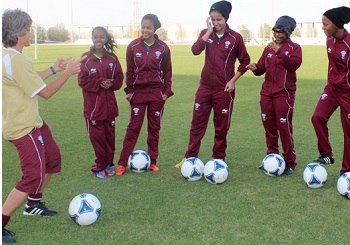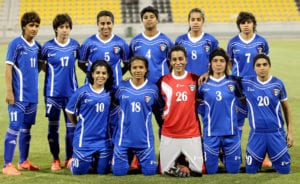There is currently a general ban, imposed by the Saudi Arabian government, on their women participating in professional sport and attending sports fixtures. In September 2014, they were banned from competing at the Asian Games; that 2 athletes were permitted to compete at the London 2012 Olympics (Sarah Attar for track and field, and Wujdan Shahrkhani for judo) was a mere anomaly. This was the first time in the country’s history that this step towards fulfillment of right was seen.
There have been murmurings from Saudi Arabian officials that this will change in time for 2016, but Human Rights Watch Middle East and North Africa director Sarah Leah Whitson is not convinced, commenting: “the time for excuses is over – Saudi Arabia needs to end its discrimination against women and ensure women’s right to participate in sport on an equal basis with men”.
The Asian Football Confederation have acknowledged the cultural and social issues, inherent in their continent, that have impeded the development of women’s sport across the Middle East.
Fortunately, the severe abolition of human rights seen above is anomalous to Saudi Arabia. A more representative example of the truly progressive mindset towards women’s sport in the Middle East can be found in Qatar, where the upcoming 2022 World Cup has inspired a desire to change and develop sport for the better, for sporting, cultural, financial and social benefits.
Qatar Women’s Sport Committee aims to help women in Qatar “engage in sport”, “improve their lifestyle”, “build a stronger Olympic team”, and “contribute to the development of the entire country”; the sports incorporated are handball, football, swimming, basketball, table tennis and volleyball. The committee has imposed a three-step plan to enhance women’s sport in Qatar:
1. Development, of facilities, abilities, and resources;
2. Support, through securing sponsors, advertising and helping the less-advantaged;
3. Progress, through partnership with local and international sports federations, use of marketing and public relations, and hosting events.
The beautiful game itself, football, is finding a new base in Qatar and, more widely, the Middle East, for both men and women. In 2009, a new football centre was built at the ‘Ladies Club’ in Qatar, in which a youth women’s football team was formed, as part of the ASPIRE project.
Since 2009, women’s football in Qatar appears to have grown exponentially. The first futsal tournament took place at the Qatar Women’s Sports Dome in 2009; in 2010, the national team played their first competitive game, against Bahrain; and in 2012, the Qatar Women’s Football League was set up, which now holds 7 teams. This is a wide-spreading initiative that is seeing success, in further ‘Westernising’ the attitude towards female participation in professional sport, as well as widening participation levels in football across the nation.
German coach Monika Staab coaches each team in the league as well as managing the national side; she has spoken about the development of women’s football in Qatar in which she has had, and continues to have, such a great personal role.
“Impressed” by the progress made by women’s football, she also commended the social progress that the projects have inspired, stating that the “right message” was being sent out to Qatari women. She lauds the U14 national team that is building the foundation for a successful future on the field as well as sending out the cultural message that sport can successfully be an integral part of daily life. Staab is equally excited by the potential for change that the 2022 World Cup in Qatar brings, believing that “the World Cup could make a big contribution to society as a whole, including women”.
Similar success can be found in United Arab Emirates, where, at time of writing, the national women’s team are competing in the eight-nation Aphrodite Cyprus Cup; their first tournament involving teams from outside of the Middle East bloc. This follows an initiative dating back just 6 years, to 2009, when the UAE Women’s Football Committee aimed at founding a female national football team, encapsulating the rapid exponential growth of women’s sport in the Emirates, and indeed the Middle East as a whole. Hafsa al Ulama, managing director of Global Ideas, desires for women to have the same sporting opportunities as men; the work put in over just half a decade makes this desire look increasingly achievable.
Thus, despite the anomalous backwardness of Saudi Arabia in this regard, there is clear evidence of progression for professional women’s sport, and sport in general at any level, throughout the Middle East. With a home World Cup on the horizon, Qatar are the forerunners in this regard, especially with the impressively wide-reaching and successful ASPIRE project.
Written by Alex Beck



